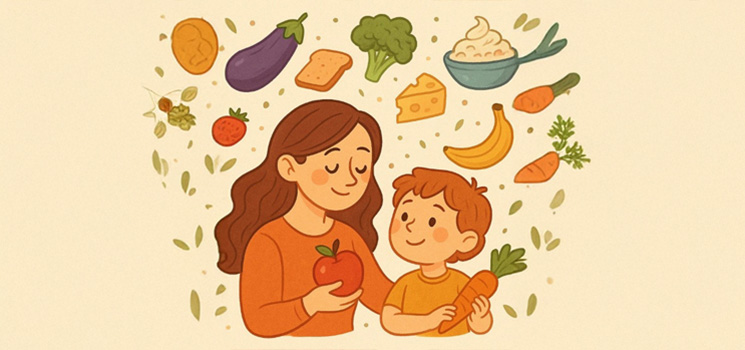Nutritious Food for All – From Children to the Elderly
Healthy food is a right, not a privilege — from childhood to old age, let’s make nutrition count.
In every stage of life, food is more than just fuel, it’s the foundation of our health, energy, and well-being. From the early days of childhood to the golden years of old age, nutrition plays a vital role in growth, development, prevention of disease, and maintaining a good quality of life.
But nutritional needs aren’t one-size-fits-all. They evolve with age, activity levels, and health conditions. This makes it essential to understand how to nourish every age group properly.
Let’s explore what nutritious food looks like across different life stages and how we can ensure everyone gets what their body truly needs.
Nutrition for Children: Building Blocks for Life

Childhood is a time of rapid growth and development. The right nutrition during this stage lays the groundwork for lifelong health.
Key nutrients for children:
- Protein: For muscle development and immune function.
- Calcium & Vitamin D: Crucial for strong bones and teeth.
- Iron: Important for cognitive development.
- Healthy fats: Necessary for brain development.
- Fruits and vegetables: For fibre, vitamins, and minerals.
Tips:
- Begin the day with a nutritious breakfast
- Include a variety of colourful fruits and vegetables
- Limit sugary snacks and drinks
- Encourage water instead of sodas or juices
- Develop regular meal and snack times
- Offer colourful meals with a mix of food groups
- Encourage healthy snacks between meals
Nutrition for Teenagers: Fuelling Growth and Hormonal Changes

Adolescence brings about a growth spurt and major hormonal changes, requiring more calories and nutrients to support development.
Key nutrients for teenagers:
- Iron: Especially important for menstruating girls.
- Protein: For muscle and tissue development.
- Calcium: To reach peak bone mass.
- B vitamins & zinc: Important for energy and metabolism.
Tips:
- Don’t skip meals, especially breakfast
- Balance fast food with home-cooked, nutritious meals
- Choose whole grains over refined ones
- Snack smart: nuts, fruits, yogurt over chips and sweets
- Stay active — aim for 30 minutes daily
- Learn to read food labels and make informed choices
- Encourage hydration and avoid sugary sodas
Nutrition for Adults: Maintaining Health and Preventing Disease

In adulthood, the focus shifts to energy maintenance, disease prevention, and managing work-life balance with healthy food choices.
Key nutrients for adults:
- Fiber: To aid digestion and reduce cholesterol.
- Lean proteins: To maintain muscle mass.
- Antioxidants: To combat cellular damage.
- Healthy fats (omega-3s): For heart and brain health.
Tips:
- Follow a balanced diet: carbs, protein, healthy fats, and fibre
- Control portion sizes — avoid overeating
- Prepare meals at home as much as possible
- Stay hydrated, 6–8 glasses of water daily
- Reduce salt, sugar, and oil in cooking
- Schedule regular health check-ups
- Limit processed foods and avoid emotional eating
Nutrition for the Elderly: Supporting Longevity and Independence

Later years require careful attention to nutrient intake to maintain health, mobility, and independence, even with reduced appetite or chewing issues.
Key nutrients for seniors:
- Calcium & Vitamin D: To protect against osteoporosis.
- Vitamin B12: Which becomes harder to absorb with age.
- Protein: To prevent muscle loss (sarcopenia).
- Fiber & hydration: To support digestion.
Tips:
- Focus on nutrient-dense foods (calcium, vitamin D, fibre)
- Eat soft, easy-to-digest meals if needed
- Monitor and manage blood sugar, BP, and cholesterol
- Avoid skipping meals, small, frequent meals are helpful
- Stay socially connected during meals to improve appetite
- Stay physically active, even light walking helps digestion
Universal Tips for All Age Groups
No matter your age, these core principles help build a healthier body and mind:
- Eat seasonal, locally available foods
- Practice mindful eating, chew slowly, and eat peacefully
- Choose clean, safe drinking water
- Avoid processed and packaged junk food
- Cook with love, food nourishes both body and soul
Final Thoughts
Nutrition is not just about eating, it’s about living well at every age. Whether it’s a toddler taking their first bites or a senior enjoying a warm bowl of soup, everyone deserves access to food that nourishes both body and soul.
By promoting healthy eating habits and ensuring food accessibility for all, we can create a healthier, more equitable world — one plate at a time.
Let’s build a healthy nation — one plate at a time…!

~ Written by Dr. Ritu Prasad
Naturopathy Department

